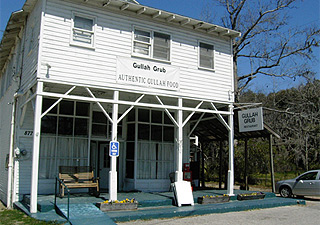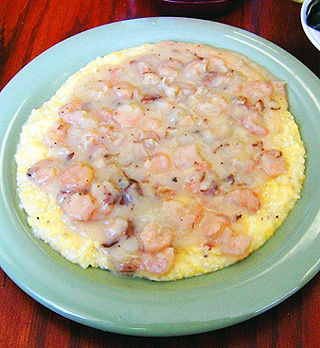
The barrier islands of South Carolina are home to the Gullah, an African-American people descended from slaves brought to the southern colonies in the early 18th century, specifically for their ability to cultivate rice and for their innate resistance to diseases like malaria and yellow fever. The name is probably an adaptation of Gola, the name of a tribe originating in what is now Liberia and Sierra Leone.
When the plantation system was dismantled and the slaves freed, many Gullah settled in coastal areas and barrier islands, where their isolation allowed them to preserve many African customs. In addition to basket weaving (you can buy sweet-grass baskets from Gullah vendors in the open air Charleston Market), these customs included the cultivation of rice, and shrimp fishing, which remained their sole means of existence (apart from trapping and some trading). Gullah villages often mimic African tribal villages in their circular layout, and the Gullah language is rife with African expressions. The Gullah absorbed many Native American customs and folkways as well.
Over the last few years, though Gullah culture has been under attack from the forces of real estate development. The islands of St. Helena, Daufuskie, and Edisto—historically Gullah strongholds—are rapidly being transformed into vacation destinations. However, it’s still possible to find traces of Gullah culture, especially if you’re willing to look in out-of-the-way places. On the island of St. Helena, Frogmore stew—a boil-up of assorted seafood, pork sausage, and corn on the cob—is still popular. It’s named after the town of Frogmore, a crossroads of the most visible Gullah settlement on the island.

In Beaufort, South Carolina, you can sample shrimp gravy, arguably the premier Gullah dish. At Belle’s Low Country Home Cooking, they serve up the sumptuous stew of freshly caught shrimp in a pale bacon gravy, poured over a plate of grits. Frogmore stew is also on the menu at this small, tidy diner.
If you want to find out more about Gullah cooking, there are a few Gullah cookbooks available. One is Bittle en’ T’ing, Gullah Cooking with Maum Chris, a series of transcribed oral recipes that show the Gullah at their most cash-strapped, rural, and resourceful—recipes for roast skunk and squirrel stew are among the offerings. Another, Gullah Home Cooking the Daufuskie Way, is evidence of a more modernized and upscale existence, including recipes for conch soup, pot roast, and deer burgers. It’s a cuisine that deserves to be better known.
Belle’s Lowcountry Home Cooking 911 Boundary St., Beaufort, SC (843-986-1185)
Explore more forgotten cuisines of America.



 Pinterest
Pinterest


